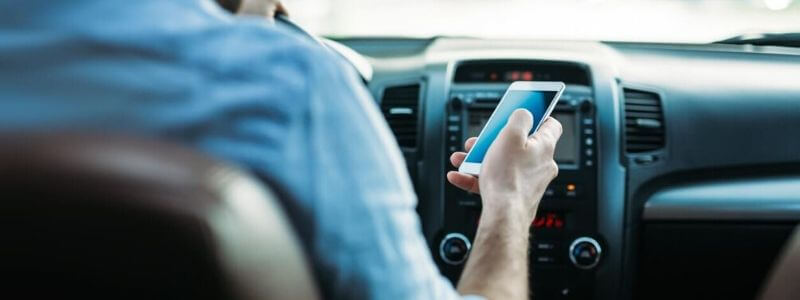When was the last time you left home without your phone? Whether you’re having dinner with friends, out running errands, or driving your car, it’s almost become second nature to rely on mobile devices for everything – to stay in touch with people, read reviews of products at the grocery store, and for plugging in addresses on the GPS. While helpful, it’s also no secret they are also highly distracting. So much so, that the Florida legislature enacted Florida Statutes section 316.305 to prohibit their use while operating a motor vehicle.
But cell phones are only the tip of the iceberg. There are several other ways a driver can get distracted – and all of them could cost you your life.
6 Common Distractions While Driving
1. Cell phones
As mentioned above, cell phones take the number one spot for distracted driving. Despite the vast number of warnings, the fact remains that people get a dopamine hit in their brains when they receive a notification. The best way to avoid the anxiousness that comes with wanting to check notifications immediately is to either silence your phone while driving, download an app that reads texts out loud or sets your phone to driving mode.
2. Radio
Whether you still listen to CDs or prefer to browse through your iTunes, Pandora, or Spotify lists, looking for the music or podcasts you love while driving can be as distracting as texting or scrolling through social media. If you want to listen to music while driving, make sure to set it up before taking your vehicle out of park.
3. Billboards
The purpose of placing billboards by the freeway is to get your attention. The problem is that they can also take away your mind from the road. And, depending on the content, it may also have an effect on your emotions. Say, for example, that you’re going through an ugly divorce and see one of the many billboards about family law firms, or if you’re reeling from the political environment in the country and you see a sign supporting a cause or candidate that makes your blood boil – these types of distractions can reduce your lateral control and affect your driving speed.
4. People in Your Car
Whether you’re laughing out loud with a friend, having a heated discussion with your partner, or telling your kids to stop arguing in the back seat, all of these interactions shift your focus from the road. And if you’re turning around — even for a few seconds — to tell off your kids, that’s enough time to cause an accident. In a best-case scenario, it would be a fender bender. In a worst-case scenario, it could end up in serious injuries or fatalities.
5. Manual Distractions
These include anything that requires you to take your hands off the wheel – such as eating, drinking, entering an address into your GPS, looking for an item in a handbag, or reaching for an item that fell off the passenger seat. You may think that if you do any of these activities while keeping your eyes on the road, you’ll be safe; but focusing your attention on any of these things means you’ll have a slower reaction time in the event that you need to suddenly brake or swerve to avoid a collision. You can avoid these distractions by eating before or after your commute and programming your GPS before leaving your parking spot.
6. Absent-mindedness
This is considered a cognitive type of driver distraction. It happens all the time. You leave work and start thinking about a myriad of topics – issues at the office, running over your to-do list, or what to make for dinner. Before you know it, you’re pulling into your driveway and don’t even remember the drive back. While this often results in a harmless commute back home, it can also result in a catastrophic event – especially if you’re upset, preoccupied, or otherwise emotionally charged.
Call Clark Hartpence Law for a Free Consultation with a Car Accident Lawyer
If you’ve been involved in a car accident and don’t know how to move forward, let us help you. Call us at (855) 680-4911 or schedule a free consultation.
Disclaimer: This blog is for informational purposes only and does not create an attorney/client relationship.
